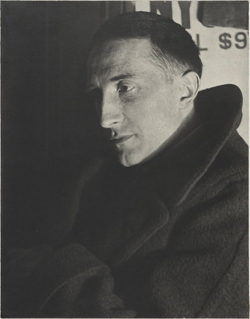Part 1: Happy Birthday, Marcel Duchamp! (July 28, 1887)
Such brutalities and the egregious exploitation of lower classes deprive elites of any entitlement to a show of dignity. Authentic dignity is clearly undeserved and the height of pretension. And makes said elite juicy targets for mockery. Charlie Chaplin made the point in 1918:
In The Adventurer, I [placed] …myself on a balcony, eating ice cream with a girl. On the floor directly underneath the balcony, I put a stout, dignified, well-dressed woman at a table. Then, while eating the ice cream, I let a piece drop off my spoon, slip through my baggy trousers, and drop from the balcony onto this woman’s neck…. Simple as this trick seems, there…was the delight the average person takes in seeing wealth and luxury in trouble….People as a whole get satisfaction from seeing the rich get the worst of things. The reason for this, of course, lies in the fact that nine tenths of the people in the world are poor, and secretly resent the wealth of the other tenth. If I had dropped the ice cream, for example, on a scrub woman’s neck, instead of getting laughs, sympathy would have been aroused for the woman….that point would not have been funny. Dropping ice cream down a rich woman’s neck, however, is, in the minds of the audience, just giving the rich what they deserve.[1]
Thus does the trickster intuitively seek to subvert power, not with power, but with tricks and pranks, to lay power low, to undermine the phony dignity of elitism. One of the trickster’s most effective tools is scatology, and thus do pranks featuring farts, poop and pee clear the air of the foul effluence of oppression, discrimination, imperialism and aggression. Flatulence and fecality throw open the windows to the free air of utopian vision, to the possibilities of the Play Society. And Nobody Does It Better[2]…than Marcel Duchamp. In this excerpt from Disruptive Play: The Trickster in Politics and Culture, I introduce Duchamp, one of the greatest tricksters of the 20th century, as prelude to dada, which he helped define, and dada’s opposition to World War One. Sometimes the absurdists are the only ones making sense.

Portrait of Marcel Duchamp, 1920–21 by Man Ray, Yale University Art Gallery
dada dramatically injected playfulness into daily life as the antidote for a civilization possessed by war’s curse. As the ecstatic and chaotic birth of the absurd in art, dada held the profound bias that art exists to create peace in the world. That art does not glorify power, it challenges it.
A wild and unstoppable gush of ideas, dada burst onto the scene with simultaneously joyful and liberated art among a crowd of artists scattered throughout Europe and the US. It could never be embodied by one person; its transformative program defied description and containment. Yet in Marcel Duchamp (1887-1968)—painter, prankster, sculptor, chess master, cross-dresser, inventor, trickster—we find an individual who sustained a dada identity beyond dada’s death and created seminal examples of disruptive play. When he introduced what was to become the most famous urinal in history, he jolted the world with playfulness, and awakened a somnambulant and serious art market.
World War I shut down the burgeoning modern art movement in Europe, particularly Paris. Energetic artists opposing the war took refuge in Zurich, birthing baby dada with the debut of the Cabaret Voltaire and challenging the seriousness that traps men into making war. Europe’s politicians ignored the pacifists’ plea, opting instead for the idiotic stridency and deadly violence of World War I.
Duchamp refused conflict and championed the essential magic of play, humor, laughter, and even dared his dada colleagues to look at their own tactics: “They were…fighting the public. And when you’re fighting you rarely manage to laugh at the same time.”[3]
Many forms of competition and ranking are at their core absurd. Sports, beauty contests, stock markets, Top Ten lists, elections, corporations and wars all have their legitimate detractors. There is fun and excitement and sometimes improved services and products that come of competition. But it runs rampant, it’s out of proportion. At its worst, it breeds political games that collapse into war. Duchamp the pacifist chose to attack competition within the art world, part of the same malady; this arena allowed his brilliant wit its full range. [4]
[1] American Magazine 86 (November 1918):34, 134-37.
[2] Words by Carole Bayer Sager, with music by Marvin Hamlisch, as sung by Carly Simon.
[3] Marcel Duchamp, quoted in Duchamp, by Calvin Tomkins (New York: Henry Holt, 1996, p. 193).
[4] Dan Franck, Bohemian Paris: Picasso, Modigliani, Matisse, and the Birth of Modern Art (New York: Grove, 2007).

Haven’t seen the movie “Poor Things?” Want its surprises? Then GO SEE IT before you read this… and in the meantime, click the image below v v v A LITTLE PLUG FOR YOU BOOK CLUBBERS [CLICK!] In their 2018 period comedy The Favourite, Arizonan Emma Stone and Athenian Yorgos Lanthimos gave us clues of mischief...
HEY PLAYSTERS! Apropos of nothing, I want to share with you an excerpt from Disruptive Play: The Trickster in Politics and Culture. Well, not quite nothing. For the most direct route to Trickster essence is through its Great American Icon, Bugs Bunny. When I wrote Disruptive Play, not so long ago, I was certain that...
This year, we observe the Rev. Martin Luther King, Jr.’s birthday on January 15th. May that transcendent leader for civil rights, a just society, and spiritual growth continue to inspire. But EVERY year, January 17th is International Trickster Day (I hereby declare). No fewer than six of history’s great tricksters were born on this day,...